One of the delights of reaching the end of a day’s activity on the hills is the anticipation of replacing all that expended energy with a tasty meal in the comfort of your camp.
While weight is not a major consideration if you’re returning to a basecamp where your vehicle has all your food, but if you’re backpacking on a multi-day trip, or wild camping up on the mountains, you’re going to want maximum energy and ease of use with as little weight as possible.
Supermarket dried food meals such as pasta and sauce, noodles and similar contain the carbohydrates and won’t weigh down your pack too much, but you’ll be left with washing up which, particularly on a wild camp, means risking polluting the environment, even if only in a minor way, as well as using up fuel to heat the washing-up water.
Our favourite solution for a wild camp or a short back-pack is the meal that cooks in its pouch. All you need is hot water, or even cold water in some cases, and a spoon or fork to stir and eat. A simple stove and single pan, or upright heat-exchanger type, will provide the small amount of hot water needed. Only one of the meals in the test required a separate pan for preparation.
Put the used pouch in a plastic bag and carry it out, and your impact on the upland environment is minimised.
So this test includes pre-prepared meals, some dried, some ‘wet’, all of which need only a relatively small amount of water. Most are main meals, but there are also breakfasts and desserts.
We’ve evaluated them for their packed weight, how much energy they provide for your hard-earned cash, the overall nutritional balance and, most importantly, their taste, though of course the last criterion is to some degree subjective.
The energy and nutrition values are those provided by the manufacturers; the pack weights are our measurements.
Adventure Food Chicken Curry
Price: £5.50
Pack weight: 164g
Total energy per pack: 600kcal
Cooking time: 8 minutes
Country of manufacture: Netherlands
Energy per 100g: 413kcal
Fat: 10 per cent (saturates 7 per cent)
Carbohydrates: 66 per cent (sugar 9 per cent)
Protein: 12 per cent
Fibre: 3 per cent
Salt: 2.6 per cent
Allergens: soya, milk, celery, (nut traces)
Vegetarian/vegan: no
The Adventure Food from outdoors brand Trekmates is a dried meal, with a low pack weight. Rehydration involves boiling a small amount of water and then tearing off the top strip and, after removing an oxygen-absorber sachet, adding the water to a level marked on the exterior of the pack. This makes it a little harder to judge than where the level is on the inside of the pack.
You need to stir the contents well and then reseal the pouch and leave for eight minutes.
The meal kept its heat reasonably well during this time although by the end of eating it at camp, it was just warm enough.
The taste was good and, for those who don’t like very hot curries, quite mild in its spices. The chicken content is actually quite small – six per cent – the meal is mainly rice. The small chicken chunks remained a little chewy despite rehydrating them correctly.
The meal felt quite filling and actually provides a good amount of energy, appreciated at the campsite.
Taste: 22/30
Energy: 16/20
Ease of use: 13/20
Weight: 8/10
Nutrition: 7/10
Value for money: 7/10
Total: 73/100
Adventure Food Pasta Bolognese
Price: £5.50
Pack weight: 172g
Total energy per pack: 600kcal
Cooking time: 8 minutes
Country of manufacture: Netherlands
Energy per 100g: 392kcal
Fat: 10 per cent (saturates 6 per cent)
Carbohydrates: 61 per cent (sugar 12 per cent)
Protein: 15 per cent
Fibre: 5 per cent
Salt: 3.4 per cent
Allergens: wheat (gluten), milk, egg, (nut and peanut traces)
Vegetarian/vegan: no
Preparation is by pouring in 800ml of hot water up to external guide line, resealing and leaving to hydrate for eight minutes.
After the required time, the pasta felt a little soft, while some of the vegetables were a touch over-firm. The meal tasted quite salty – it has more than 3 per cent of its total as salt – but was filling. For a bolognese, it lacked the familiar tomato base to some degree.
A pack will give you a useful 600kcal of energy and most of this comes from non-sugar carbohydrates – so is likely to be good for slow release of your body fuel on the hill. The Adventure Food bolognese also provides some protein and a little fibre.
Taste: 19/30
Energy: 16/20
Ease of use: 13/20
Weight: 8/10
Nutrition: 7/10
Value for money: 7/10
Total: 70/100
Adventure Food Rice Satay
Price: £5.50
Pack weight: 190g
Total energy per pack: 600kcal
Cooking time: 8 minutes
Country of manufacture: Netherlands
Energy per 100g: 405kcal
Fat: 11 per cent (saturates 4 per cent)
Carbohydrates: 65 per cent (sugar 14 per cent)
Protein: 12 per cent
Fibre: 4 per cent
Salt: 2.2 per cent
Allergens: soya, milk, peanuts, gluten, (nut traces)
Vegetarian/vegan: no
Preparation is similar to many of the dehydrated meals in the test: tear off the top strip of the pouch, pour in hot water, reseal the pack and leave to stand for eight minutes. There are markings on the outside of the pack to help you fill with the correct amount of water, 320ml.
After it has rehydrated, stir again and eat.
The rice satay, called Sate Bai in the pack’s main lettering, contains ham, green beans, leak and carrot in a satay sauce.
The meal had good consistency and tasted good too, with just a hint of sweetness in the sauce. It did, however, taste quite salty. Overall texture of the reconstituted food was good.
The satay provided a good amount of energy, 600kcal, and felt filling after a day in the great outdoors. Fat content was fairly low and the proportion of sugars in the carbs was also low, but the salt content was quite high.
Taste: 20/30
Energy: 16/20
Ease of use: 13/20
Weight: 7/10
Nutrition: 7/10
Value for money: 7/10
Total: 70/100
The Rice Satay was provided to grough by Cotswold Outdoor
Expedition Foods Chicken Tikka with Rice
Price: £6.99
Pack weight: 170g
Total energy per pack: 809kcal
Cooking time: 8 minutes
Country of manufacture: UK
Energy per 100g: 578kcal
Fat: 41 per cent (saturates 10 per cent)
Carbohydrates: 37 per cent (sugar 5 per cent)
Protein: 14 per cent
Fibre: 4 per cent
Salt: 0.6 per cent
Allergens: milk, mustard
Vegetarian/vegan: no
The Expedition Foods curry is a freeze-dried meal with a high energy content.
It is prepared by removing the oxygen absorber sachet, in common with most of the dried meals in the test, and adding 420ml of hot water, stirring and leaving to rehydrate for between five and eight minutes in the resealed packet. There’s no measure on the pack, so you have to find a way of determining the correct amount.
In use, we found you need to leave the meal for at least the full eight minutes and in fact it benefited from a couple of minutes longer.
Taste was very good, and the texture was nice too. It certainly felt filling at the end of a day’s walking and will provide a good proportion of your energy needs for an active day.
The fat content was fairly high, which probably helped make the meal feel filling. The meal is essentially a tasty rice with just less than 10 per cent chicken. About 37 per cent of the meal is carbohydrate, a little less than fat. Salt content is very low.
Taste: 23/30
Energy: 19/20
Ease of use: 11/20
Weight: 8/10
Nutrition: 6/10
Value for money: 8/10
Total: 75/100
Summit To Eat Chocolate Mousse with Cherry Granola
Price: £4.50
Pack weight: 124g
Total energy per pack: 416kcal
Cooking time: 8 minutes
Country of manufacture: UK
Energy per 100g: 429kcal
Fat: 8 per cent (saturates 3 per cent)
Carbohydrates: 73 per cent (sugar 31 per cent)
Protein: 12 per cent
Fibre: 8 per cent
Salt: 0.7 per cent
Allergens: milk, oats.
Vegetarian: yes; vegan: no
This dessert from Summit To Eat is freeze dried and was a good supplement to a main meal.
Preparation is by adding 145ml of cold water to the pouch, stirring, resealing it and leaving it for eight minutes to rehydrate.
The base is chocolate mousse, making up three-quarters of the ingredients. This is sweet without being over sugary in taste. What’s nice about this pudding is the addition of oats and sour cherries, which give a counterpoint to the sweet mousse and an interesting crunch to the dessert.
Taste was very good and, as long as the mousse is stirred properly, the consistency was right too.
The Summit To Eat dessert has a good amount of energy which, combined with a main meal beforehand, provides a good proportion of the needs of an outdoor enthusiast. As you would expect, carbohydrate content is high, and almost a third of this comes from sugar.
Fat and salt are low, and there’s a little fibre there from the oats.
A very enjoyable addition to the main meal at camp.
Taste: 23/30
Energy: 14/20
Ease of use: 17/20
Weight: 9/10
Nutrition: 8/10
Value for money: 7/10
Total: 78/100
Summit To Eat Morning Oats with Raspberry
Price: £4.50
Pack weight: 118g
Total energy per pack: 427kcal
Cooking time: 8 minutes
Country of manufacture: UK
Energy per 100g: 469kcal
Fat: 19 per cent (saturates 11 per cent)
Carbohydrates: 60 per cent (sugar 31 per cent)
Protein: 11 per cent
Fibre: 6 per cent
Salt: 0.4 per cent
Allergens: milk, oats.
Vegetarian: yes; vegan: no
Oats are viewed as a good way to kick start a day in the hills because of the slow-release energy they give.
Although almost of third of the energy in this Summit To Eat breakfast comes from sugars, a similar amount is from other carbs.
Hot water is poured into the pouch after tearing open the top. There’s a measuring line on the inside of the pack to indicate when the correct amount, 225ml, has been added. Stir the mix and reseal the pouch and wait for eight minutes while your breakfast cooks.
A quick stir again and the morning oats are ready. Consistency was good; no lumpy porridge, and not too runny. We liked the taste, in particular the raspberry pieces. Despite there being quite a lot of sugar in the meal, it didn’t taste oversweet.
The Morning Oats with Raspberry made a nice change from cold cereal or even energy bars that tend to be the staple camp breakfast. The use of a pouch minimises washing up too, so there’s only your spoon to clean afterwards before you hit the trail again.
Taste: 22/30
Energy: 14/20
Ease of use: 16/20
Weight: 9/10
Nutrition: 7/10
Value for money: 7/10
Total: 75/100
Summit To Eat Rice Pudding with Strawberry
Price: £4.50
Pack weight: 112g
Total energy per pack: 404kcal
Cooking time: 8 minutes
Country of manufacture: UK
Energy per 100g: 469kcal
Fat: 16 per cent (saturates 10 per cent)
Carbohydrates: 75 per cent (sugar 39 per cent)
Protein: 6 per cent
Fibre: 2 per cent
Salt: 0.2 per cent
Allergens: milk. The meal is gluten free.
Vegetarian: yes; vegan: no
This freeze-dried dessert provides and extra boost of energy after a main meal.
Preparation is easy: tear open the pouch and remove the oxygen absorber sachet, then pour in hot water. There’s a marking on the inside of the pouch, so it’s simple to see when the required volume has been added.
Stir the pudding then reseal the pack and leave for eight minutes.
The dessert was a little runny after eight minutes, but thickened up to the right consistency within two or three minutes, suggesting that would be a better time to leave it to rehydrate.
Taste was good with a nice strawberry flavour and the pudding wasn’t oversweet. The chunks of berry were a nice addition and the Summit To Eat dessert felt quite filling.
As you would expect from a rice pudding, carb content was high, with almost 40 per cent of the dessert consisting of sugars.
Taste: 22/30
Energy: 13/20
Ease of use: 16/20
Weight: 9/10
Nutrition: 7/10
Value for money: 7/10
Total: 74/100
The Summit To Eat Rice Pudding was suppled to grough by Cotswold Outdoor.
Summit To Eat Vegetable Chipotle Chilli with Rice
Price: £5.50
Pack weight: 160g
Total energy per pack: 628kcal
Cooking time: 8 minutes
Country of manufacture: UK
Energy per 100g: 462kcal
Fat: 22 per cent (saturates 3 per cent)
Carbohydrates: 61 per cent (sugar 15 per cent)
Protein: 11 per cent
Fibre: 14 per cent
Salt: 1.1 per cent
Allergens: None. The meal is gluten and dairy free.
Vegetarian: yes; vegan: yes
This is the only meal in the test that is marketed as suitable for both vegetarians and vegans.
It contains chipotle chillies, though the proportion is low, and the meal wasn’t particularly hot.
The Summit To Eat meal was filling, with lots of rice and kidney beans. There’s also quite a lot of cauliflower and that was evident in the taste.
Preparation of this freeze-dried meal is similar to most of the dry food in the test: tear off the top strip, pout in hot water – 550ml in this case, reseal and wait eight minutes.
Consistency of the rice and vegetables was good, and the meal provides a good amount of energy.
A good choice for those seeking a meat and dairy free meal.
Taste: 19/30
Energy: 17/20
Ease of use: 16/20
Weight: 8/10
Nutrition: 7/10
Value for money: 8/10
Total: 75/100
Trek’n Eat Chicken in Curried Rice
Price: £6.39
Pack weight: 226g
Total energy per pack: 786kcal
Cooking time: 10 minutes
Country of manufacture: Germany
Energy per 100g: 393kcal
Fat: 10 per cent (saturates 5 per cent)
Carbohydrates: 58 per cent (sugar 8 per cent)
Protein: 14 per cent
Fibre: 3 per cent
Salt: 4.3 per cent
Allergens: butter, cream, lactose, almonds. The meal is gluten free.
Vegetarian/vegan: no
The meal is prepared by tearing open the pouch and adding 520ml of boiling water. There’s an external scale on the packet’s side to help. Stir and reseal, then leave for 10 minutes.
After this time, the meal had rehydrated well, with a final stir ensuring the contents were properly mixed.
The texture of the small chicken lumps was quite good and the general consistency of the meal was right. Taste was good, though it did seem a little salty.
The pack provides a good amount of energy – 786kcal – and was quite filling. Rice makes up the biggest part of the meal, with chicken constituting 8 per cent of the dried content. Fat is quite low at about 11 per cent.
Carbs make up 63 per cent, with protein 14 per cent. The salt content is quite high at nearly 5 per cent, which was borne out by the taste of the meal.
The Trek’n Eat pack helpfully has a second tear-notch so, once you’ve cooked it, you can remove the excess and remove the height of the pouch which makes the food easier to get at.
Taste: 20/30
Energy: 18/20
Ease of use: 14/20
Weight: 6/10
Nutrition: 6/10
Value for money: 8/10
Total: 72/100
Trek’n Eat Chocolate Mousse
Price: £5
Pack weight: 126g
Total energy per pack: 453kcal
Cooking time: 2 minutes
Country of manufacture: Germany
Energy per 100g: 453kcal
Fat: 20 per cent (saturates 15 per cent)
Carbohydrates: 54 per cent (sugar 41 per cent)
Protein: 13 per cent
Fibre: 4 per cent
Salt: 0.3 per cent
Allergens: milk, lactose. The meal is gluten free.
Vegetarian: yes; vegan: no
Preparation is simple: tear open the pouch and add 100ml of water, using the external scale on the pack to help you. Stir the mousse until it has a smooth consistency – it’s easy to miss some parts in the folds at the bottom of the pack.
If the mousse is still a little thick, it’s possible to add water to get the right thickness.
The mousse tastes very sweet, so it’s not surprising the small pack provides more than 450kcal. If you combine this with one of the brand’s main meals, you’re close to 1,300kcal, which is a useful energy intake after a hard day on the hill.
This Trek’n Eat pack also has a second, lower tear notch so it’s easier to get your spoon in.
Nutritionally, it’s high in fat at 20 per cent and of the 54 per cent carbohydrates it contains, more than 40 per cent of these are in the form of sugars. It is a very sweet dessert, which appealed to our sweet tooth but may be a little too sugary for some.
There’s a little fibre and very low salt content.
As a second-course at camp, the chocolate mousse was welcome after a day’s trekking. It’s also quick to prepare.
Taste: 20/30
Energy: 15/20
Ease of use: 16/20
Weight: 9/10
Nutrition: 7/10
Value for money: 7/10
Total: 74/100
Trek’n Eat Pasta Primavera
Price: £6
Pack weight: 176g
Total energy per pack: 605kcal
Cooking time: 8 minutes
Country of manufacture: Germany
Energy per 100g: 403kcal
Fat: 13 per cent (saturates 8 per cent)
Carbohydrates: 58 per cent (sugar 18 per cent)
Protein: 13 per cent
Fibre: 5 per cent
Salt: 3.3 per cent
Allergens: milk, lactose, eggs.
Vegetarian: yes; vegan: no
The pasta meal is prepared by pouring in 490ml of hot water, guided by the external pack markings, and resealing, then leaving for eight minutes to rehydrate.
After this time and restirring, the pasta had a good consistency. The pasta shapes are short and there was a good variety of vegetables in the meal, with lots of sweet corn, carrots and peas. The Trek’n Eat meal also contained leek, broccoli, courgettes, cauliflower, onions and cucumber.
The sauce tasted quite creamy and overall taste was good. The pasta wasn’t too soft and, although the meal has a fairly high salt content, this wasn’t evident from the taste.
Most of the energy is in the form of non-sugar carbs, which is good news for hillgoers.
For those seeking a meat-free meal, this is a good option – tasty and filling.
Taste: 20/30
Energy: 16/20
Ease of use: 15/20
Weight: 8/10
Nutrition: 7/10
Value for money: 7/10
Total: 73/100
Trek’n Eat Scrambled Eggs with Onions
Price: £4.50
Pack weight: 148g
Total energy per pack: 744kcal
Cooking time: 10 minutes
Country of manufacture: Germany
Energy per 100g: 595kcal
Fat: 48 per cent (saturates 26 per cent)
Carbohydrates: 13 per cent (sugar 13 per cent)
Protein: 27 per cent
Fibre: 1 per cent
Salt: 3.2 per cent
Allergens: milk, lactose, eggs, soy. The meal is gluten free.
Vegetarian: no; vegan: no
For those who like to get to work on the mountains on an egg, this could be a good way to start your day.
Preparation of this breakfast from Trek’n Eat is more involved than other meals in the test. You add 185ml of cold water to the mix, which is largely a combination of egg powder and milk powder. Stir it until fully mixed, then fry in a hot pan.
We found the whole exercise took about 10 minutes and obviously leaves you with a pan that needs washing up, rather than just a pouch to eat from.
The meal was very filling for a breakfast. It’s high in fat – almost half of the content is fat, and a quarter is saturated, so may prove a little slower and more difficult to digest for some before heading to another day on the hill.
All the carbohydrate content is sugar, and the salt content is fairly high at more than 3 per cent, which we found evident in the taste.
There is a good amount of energy from this Trek’n Eat breakfast, which was very filling. But it’s slower to prepare and leaves you with a pan to wash up.
Taste: 17/30
Energy: 18/20
Ease of use: 10/20
Weight: 8/10
Nutrition: 5/10
Value for money: 9/10
Total: 67/100
Wayfayrer Chilli con Carne with Rice
Price: £4
Pack weight: 316g
Total energy per pack: 435kcal
Cooking time: 7-8 minutes
Country of manufacture: UK
Energy per 100g: 145kcal
Fat: 6 per cent (saturates 2 per cent)
Carbohydrates: 17 per cent (sugar 2 per cent)
Protein: 6 per cent
Fibre: 1 per cent
Salt: 0.8 per cent
Allergens: barley (gluten)
Vegetarian/vegan: no
Wayfayrer foods are ‘wet’ boil-in-the-bag meals rather than dehydrated or freeze dried. This ups the pack weight, but simplifies cooking to some extent.
The whole pack is simply immersed in boiling water for seven to eight minutes. You then remove the pack from the pan, tear open the top of the pouch and eat. You might need to wait a minute or so until the pouch and contents cool enough to hold – or use your gloves to hold the pack.
This will use more stove fuel than meals that simply need a brief boil of a small amount of water to rehydrate, but the food is hotter, not having the need to stand to allow rehydration.
One advantage we found with the wet foods came in the taste. There’s not a huge difference between the chilli in this pouch and one you might prepare in a pan from, say a tin.
The consistency was also good, with a balanced mix of rice, beef and tomato-based sauce. It felt very filling at the end of a day’s walking, and the heat from the spices, though not excessive, adds a little zing to the meal.
There’s no problem rehydrating the food, as it already contains the right amount of water.
It wasn’t particularly high in energy content, so you might want to supplement it with a dessert. Fat and sugar were very low, and the Wayfayrer chilli had a good balance of nutrients. Salt content was low.
The Wayfayrer Chilli con Carne and Rice was one of the better tasting meals in the test, and also among the simplest to prepare.
Taste: 27/30
Energy: 14/20
Ease of use: 18/20
Weight: 5/10
Nutrition: 8/10
Value for money: 7/10
Total: 79/100
Wayfayrer Ginger Pudding
Price: £4
Pack weight: 210g
Total energy per pack: 584kcal
Cooking time: 7-8 minutes
Country of manufacture: UK
Energy per 100g: 292kcal
Fat: 13 per cent (saturates 7 per cent)
Carbohydrates: 40 per cent (sugar 26 per cent)
Protein: 3 per cent
Fibre: 1 per cent
Salt: 0.7 per cent
Allergens: wheat (gluten), milk
Vegetarian/vegan: no
The glycerine and suet in this Wayfayrer pudding are both vegetable based, so making it suitable for vegetarians.
The pudding consists of a slab of ginger sponge in a thickish ginger sauce.
Both tasted good, though the sponge isn’t that light. The balance of sweetness is about right and, combined with a main meal, this dessert made for a very filling conclusion at camp after a day on the hill.
For a dessert, sugar is fairly low at about a quarter of overall content, with carbs accounting for about 40 per cent of the pudding.
Fat is fairly low at 13 per cent, and salt is negligible.
The Wayfayrer Ginger Pudding is a nice way to round off your camp meal.
Taste: 23/30
Energy: 16/20
Ease of use: 18/20
Weight: 6/10
Nutrition: 7/10
Value for money: 9/10
Total: 79/100
Wayfayrer Pasta Bolognese
Price: £4
Pack weight: 314g
Total energy per pack: 336kcal
Cooking time: 8 minutes
Country of manufacture: UK
Energy per 100g: 112kcal
Fat: 4 per cent (saturates 1 per cent)
Carbohydrates: 13 per cent (sugar 2 per cent)
Protein: 7 per cent
Fibre: 1 per cent
Salt: 0.6 per cent
Allergens: wheat, egg (nut traces)
Vegetarian/vegan: no
As with the Wayfayrer pudding, the whole pack is immersed in boiling water for eight minutes to cook this meal.
The pasta bolognese had good taste and wasn’t salty tasting. Consistency of the meal was good and overall eating the Wayfayrer came pretty close to a ‘proper’ kitchen-prepared pasta meal. The meal has pasta shells in a tomato and herb sauce, with beef mince and mushrooms.
The pasta bolognese felt quite filling, but the energy content of the pack isn’t that high, so you’ll probably need to supplement this with a dessert or snack to follow at the end of a hard day on the trail.
Taste: 26/30
Energy: 12/20
Ease of use: 18/20
Weight: 5/10
Nutrition: 9/10
Value for money: 6/10
Total: 76/100
This meal was supplied to grough by Cotswold Outdoor.
The best tasting meals were the wet ones produced by Wayfayrer, with the Chilli con Carne with Rice topping both the taste criterion and the overall score. The flip side is that the wet meals are heavier and need more water and a bigger use of stove fuel.
The top dried food main meals were the Expedition Foods Chicken Tikka with Rice and the Summit To Eat Vegetable Chipotle Chilli with Rice, though the latter has a strong cauliflower accent so if you’re not a fan of that vegetable, it may not be for you.
For taste, the Adventure Food Chicken Curry also scored well. There weren’t many vegetarian meals but the Trek’n Eat Pasta Primavera was tasty and the Summit To Eat Vegetable Chilli scored well.
The best breakfast was the Summit To Eat Morning Oats with Raspberry, with a good taste and low weight.
For desserts, the Wayfayrer Ginger Pudding came tops, with a great taste and lots of energy at a good price. In the dried-food category, the Summit To Eat Chocolate Mousse with Cherry Granola came very close overall to the Wayfayrer pudding, and tasted very nice.
One thing to note was that there was some variation in price from different retailers, so shop around to find the best deal. Prices quoted are typical selling prices.
All the meals were supplied to grough by the brands, except where stated.
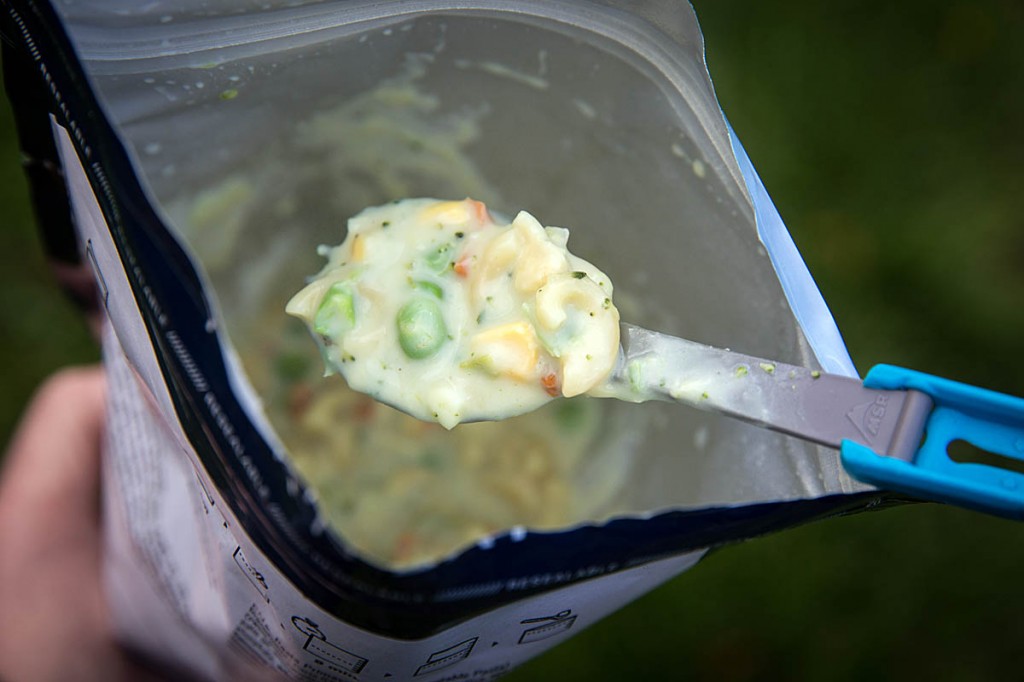
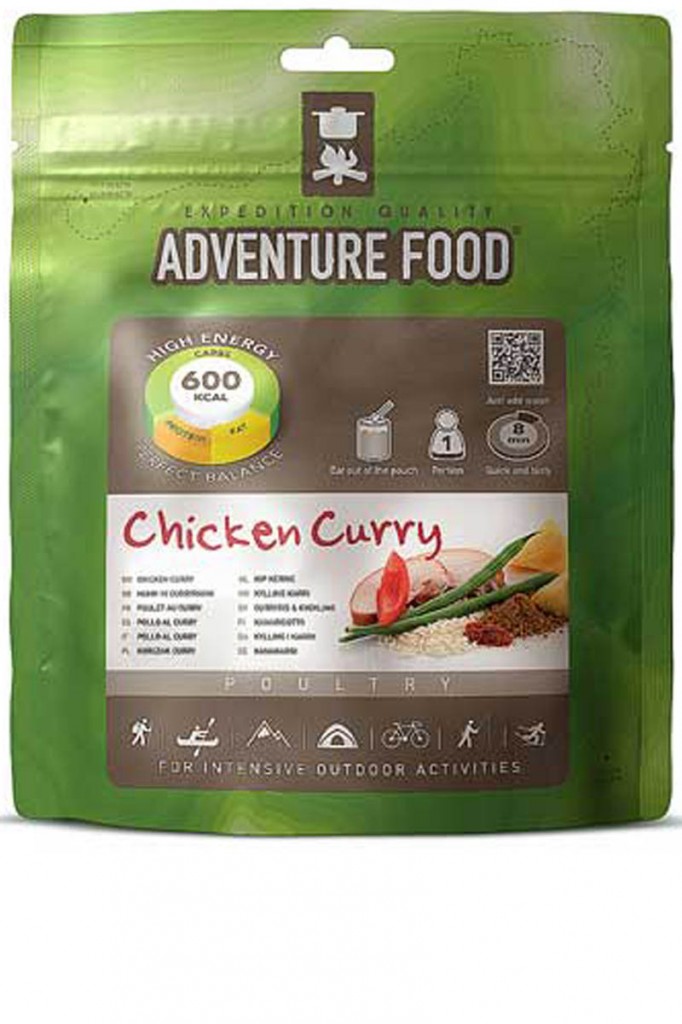
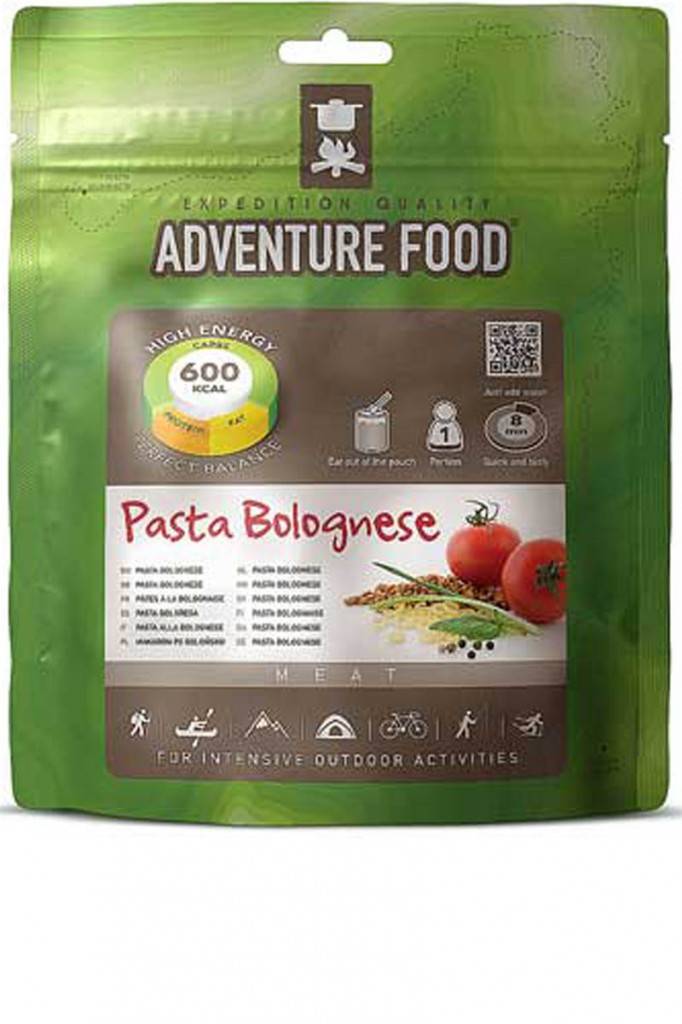
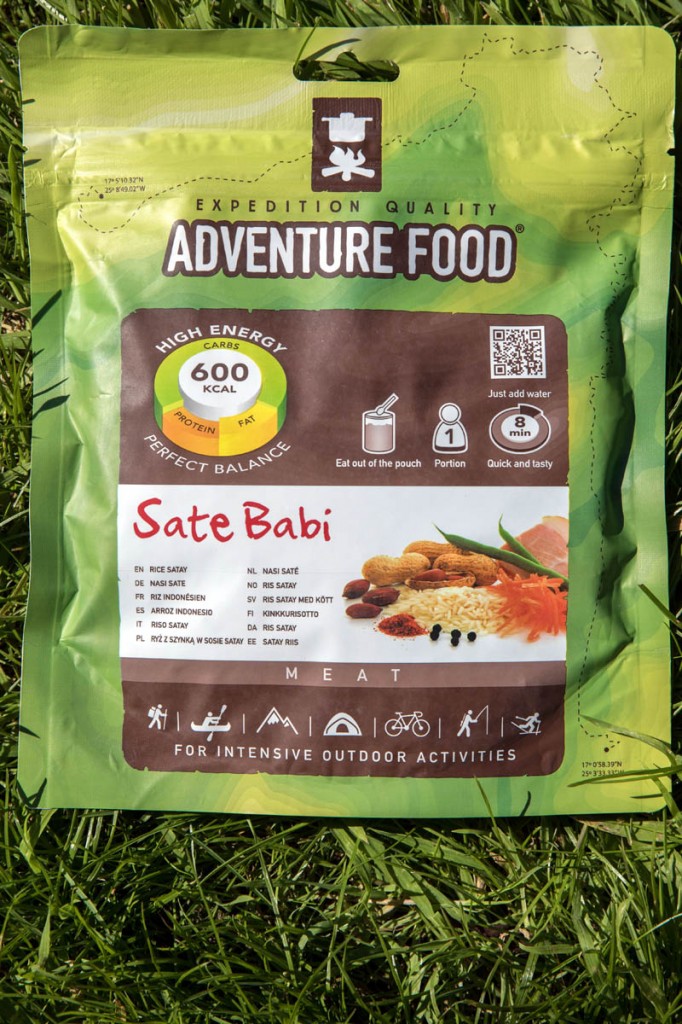
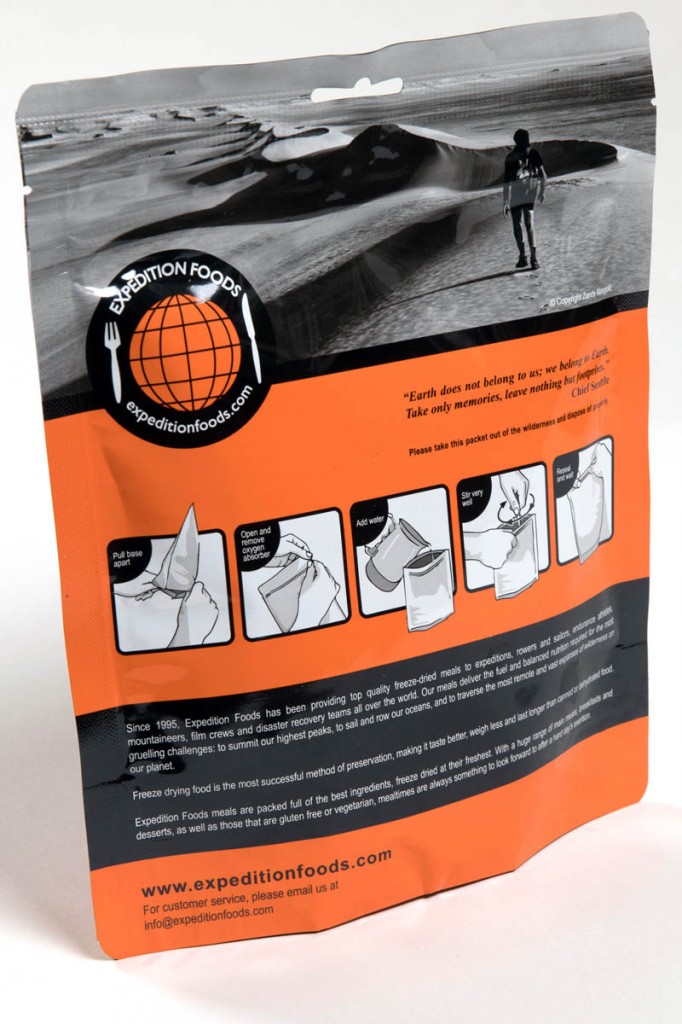
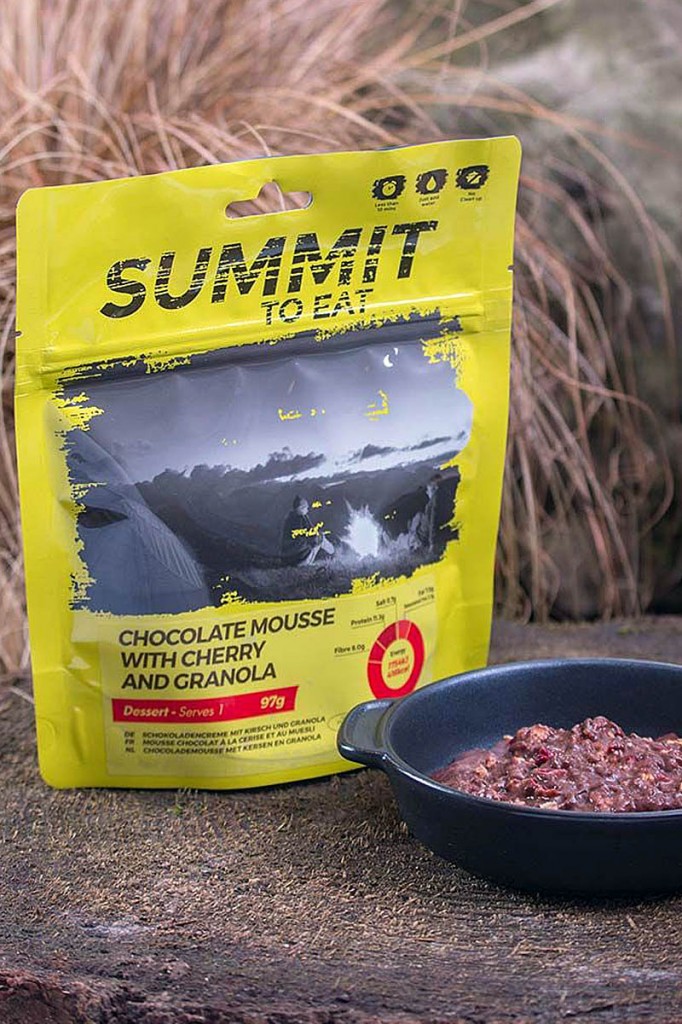
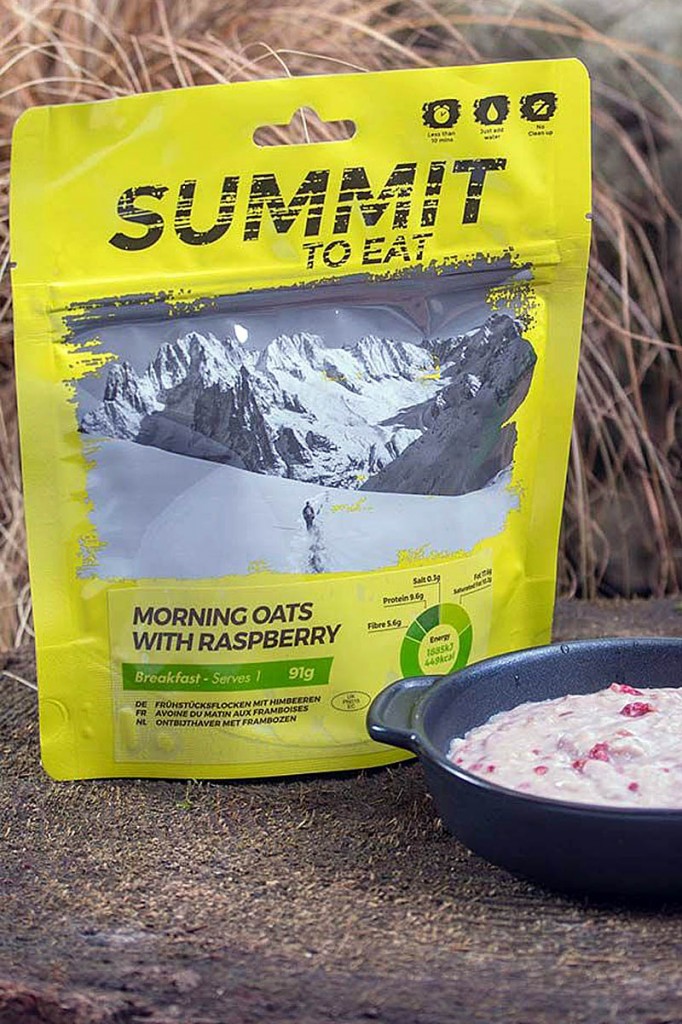
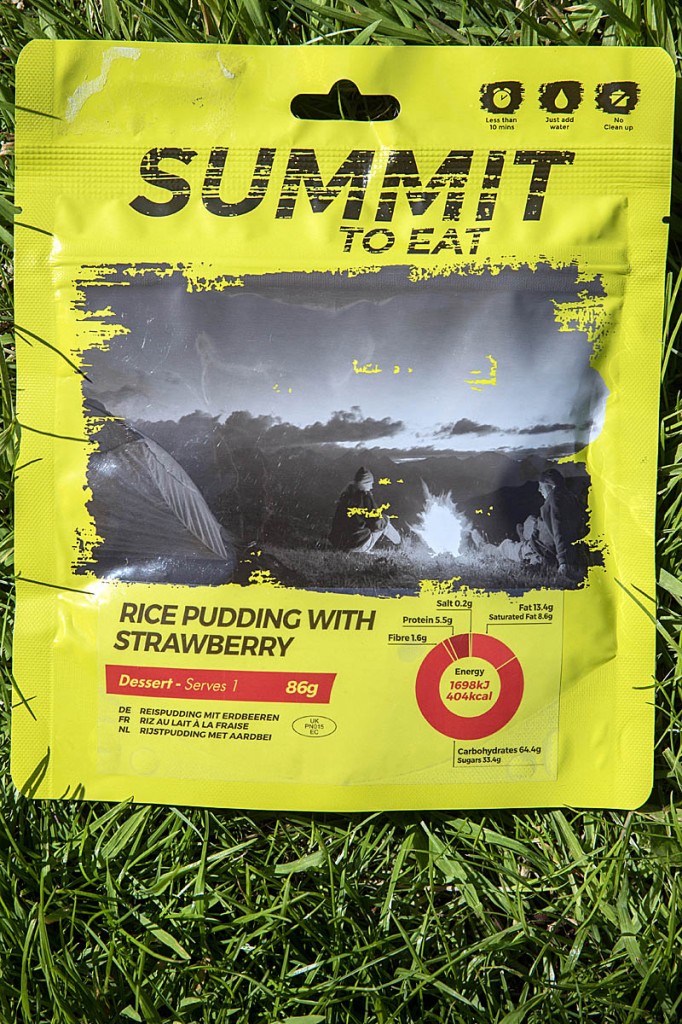
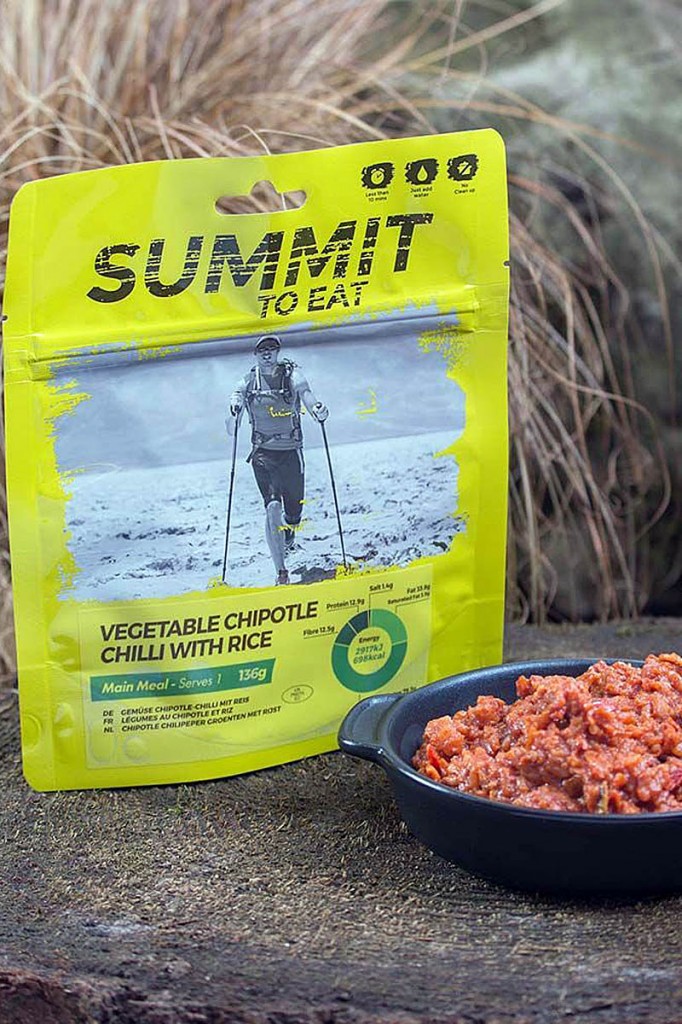
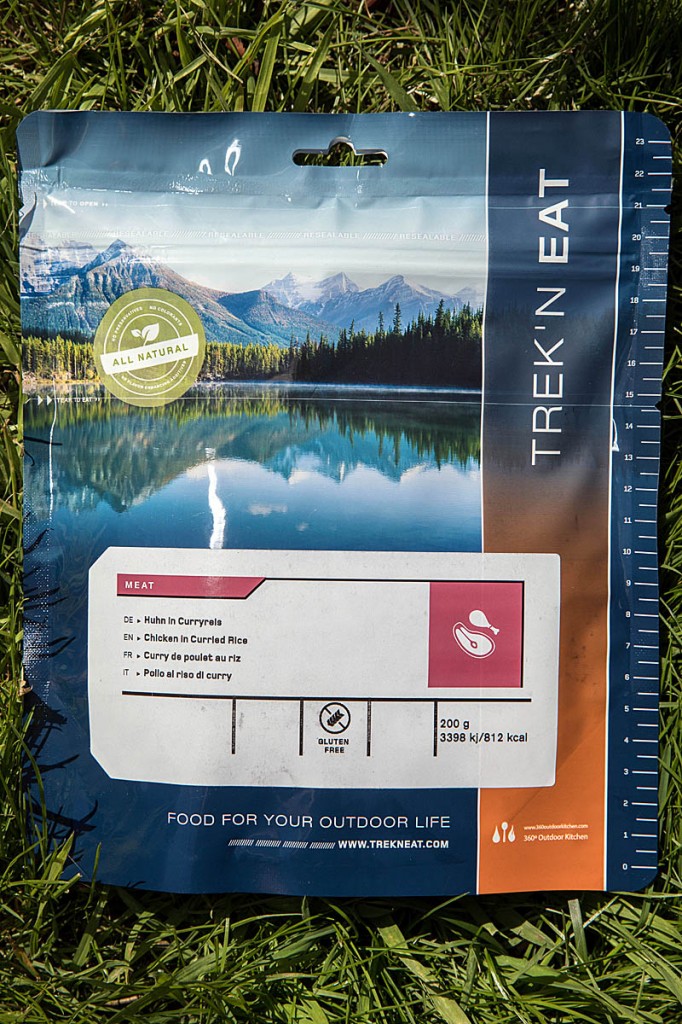
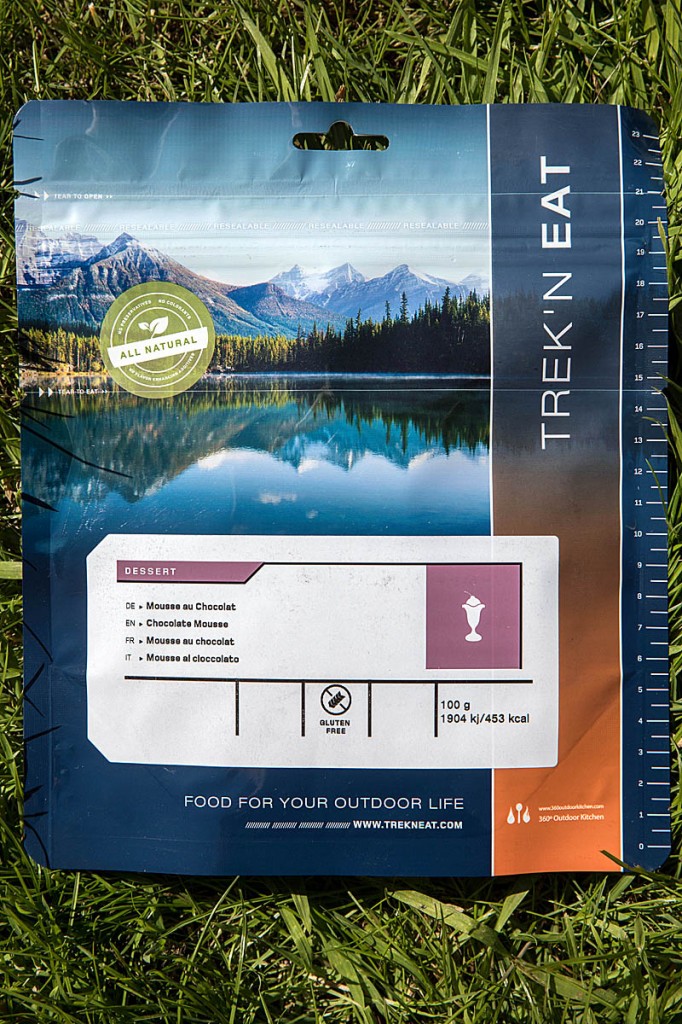
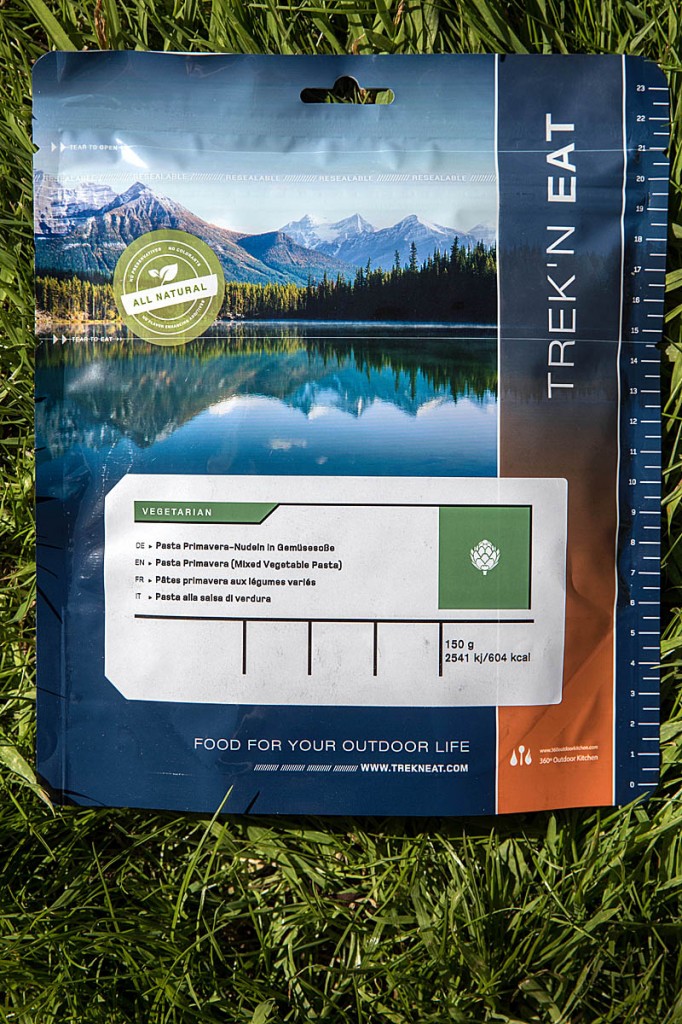
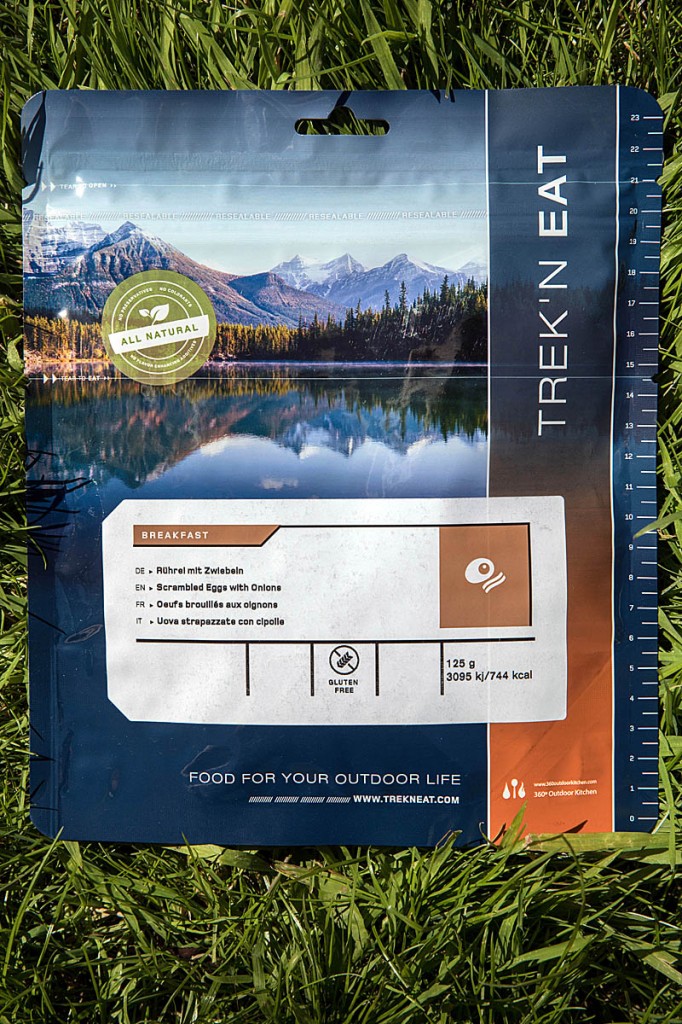
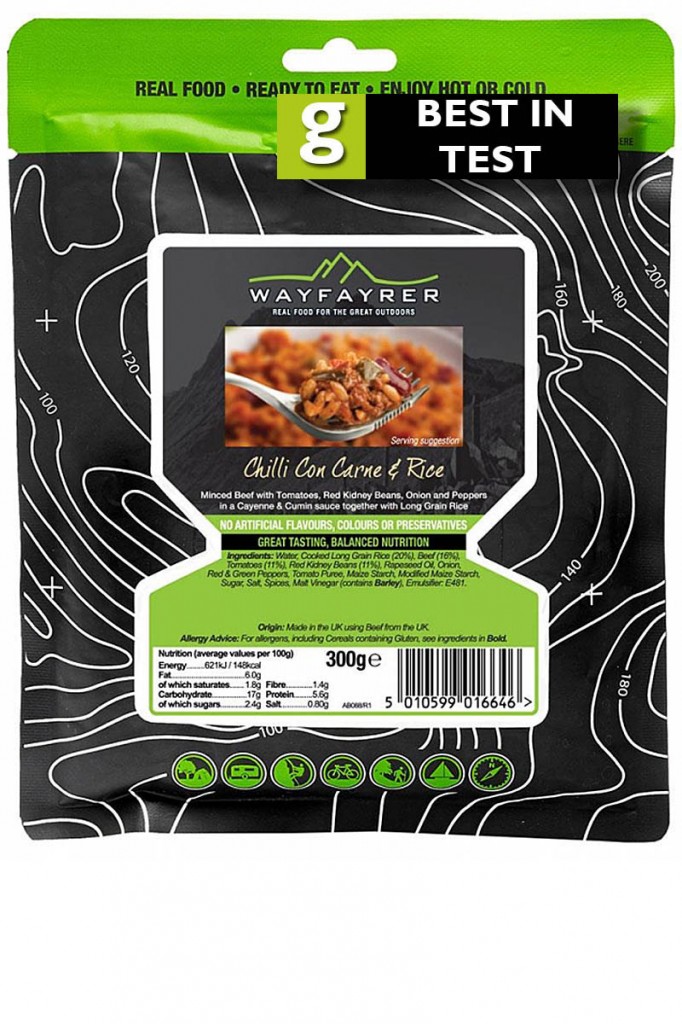
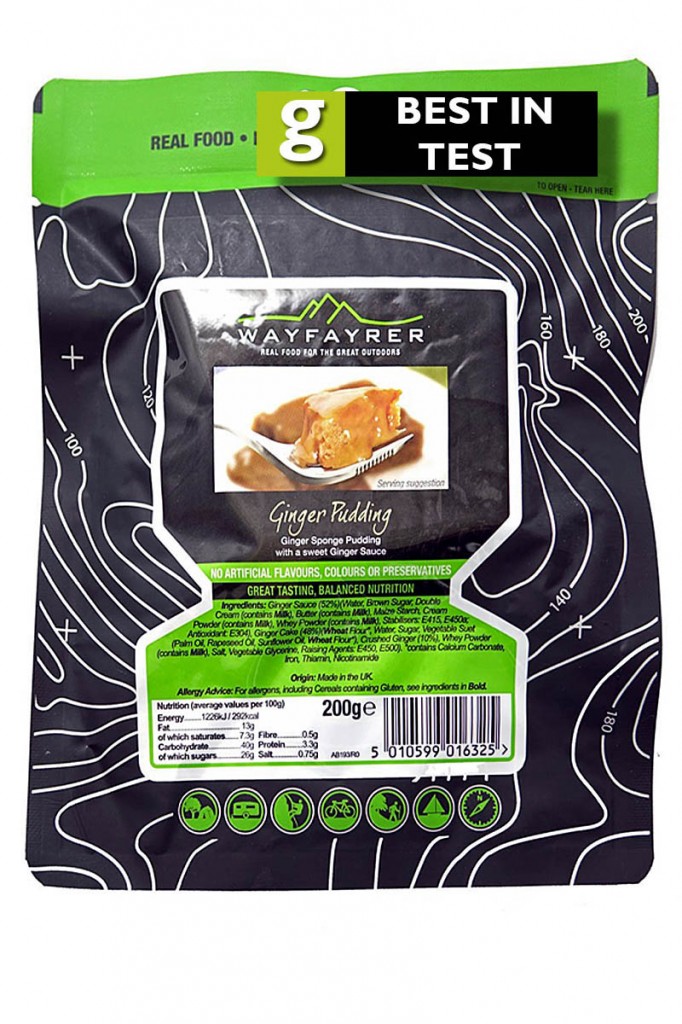
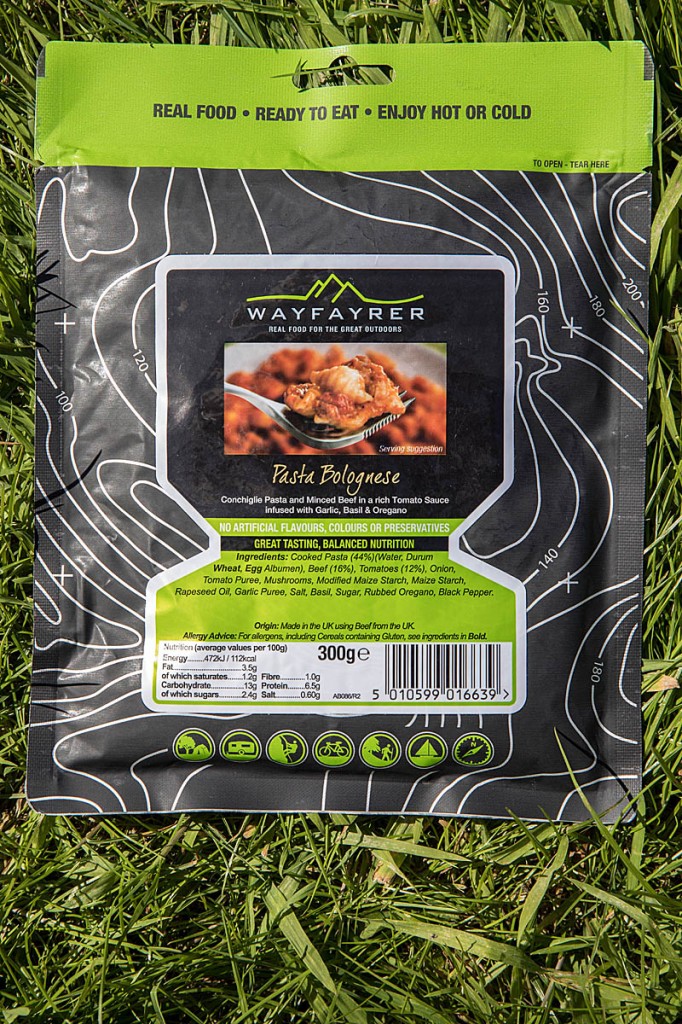
Jane
10 November 2018A very restrictive test; what about other brands such as Firepot meals from Outdoor Food?
OldManOf TheHills
13 November 2018Most are very low in calories. To maintain weight a woman needs on average of 2000 calories per day and a man needs 2500, (but in UK we average much more according to wiki).
That's 3 to 4 packs a day of the larger 600cal portions and 5 to 6 of the smaller 400cal portions. Barely adequate if you have 3 cooked meals a day and really only suitable as a light evening meal after heavy breakfast in the hostel plus pre-made sandwiches.
As don't get me going about winter climbing and walking when calorie requirements can easily top 4000 a day, and as for Greenland then 5000 might be needed.
I suspect the non-cooking millenials have been conned. You cant get up a mountain on pot noodles and real food and fuel weighs something.
Firepot at least state that their food only gives 30% of your requirements so you know you are going hungry - very hungry if in Greenland which they claim they were designed for. Firepot however additionally do slightly larger packs.
Tapsilteerie
14 November 2018Wayfayrer - Best in test - Really?
Wet food so heavy, low calorific values and small portions as mentioned above. Pretty much designed for the DofE type market. Has the advantage of being cheaper than the rest but menu choice is also very much at the 'beans and sausages ' end of the market.
The best brand I have used is Bla Band who do a good range of dried food with lots of calories and a sensible bag design that will stand up and allow you to reach the corners with your spoon without getting food up your hand and arm.
Wilderness Stew a favourite on my last big trip!